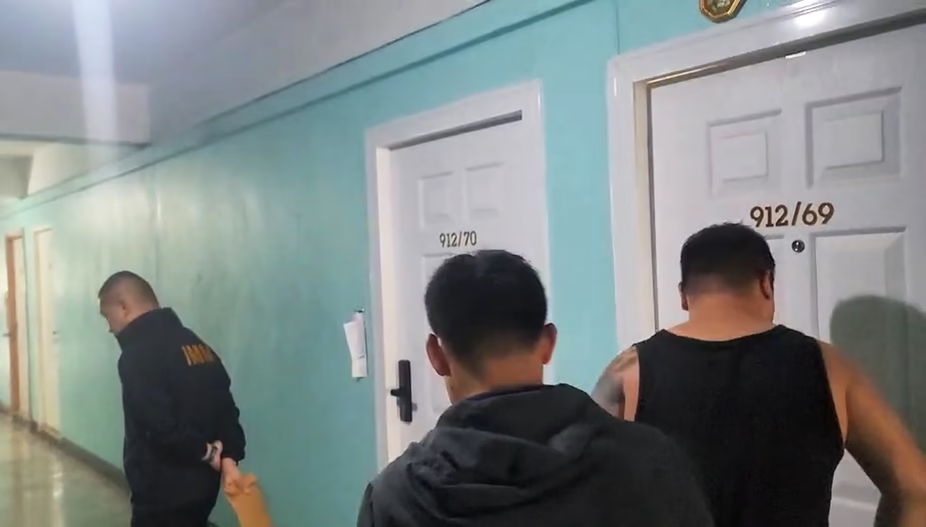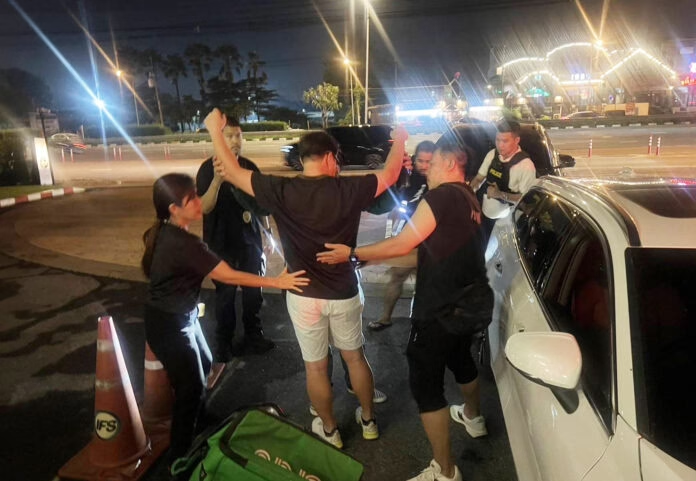BANGKOK – Immigration police have arrested a Chinese man who allegedly stole more than US $7 million in embezzled funds, then fled his China and later obtained Vanuatu citizenship. He was detained in Bangkok after reportedly spending seven years in hiding.
Pol Col Pholsit Sutthiaat, chief investigator with the Immigration police, said officers began tracking the suspect, identified only as Wu, 40, after locals reported that a foreign man was living an isolated lifestyle in a luxury house on Ratchaphruek Road in Thon Buri’s Taling Chan district. The property was said to be worth tens of millions of baht.
Undercover officers posed as security guards and watched the area for around a week. On 12 November, they noticed a white Volvo drive into the housing estate to collect Wu. It was the first time he had left the house since officers started their surveillance.
Immigration Police then set up checkpoints nearby and stopped the car when it returned in the early hours of 13 November.
Wu presented a Vanuatu passport, which showed that his permission to stay in Thailand had already expired earlier in the year. Officers arrested him on an overstay charge and took him to the Immigration Bureau for questioning.
During interrogation, Wu insisted several times that he was a Vanuatu national and not Chinese. Thai authorities later confirmed through international police channels that prosecutors in Chaozhou, Guangdong province, China, wanted him on corporate embezzlement charges.
Chinese investigators said Wu worked as head of sales for a luxury housing project in 2018. He allegedly offered 48 buyers “special prices” and told them to transfer their money into his personal bank account. The alleged fraud caused losses of more than 50 million yuan, or around 7 million dollars.
Wu left China soon after the alleged offences and is believed to have bought Vanuatu citizenship to avoid arrest. Interpol issued a Red Notice for him in 2025, which helped Thai police track him down and detain him.
Immigration officers said they are still tracing Wu’s assets in Thailand, including the luxury house, an expensive car, and any associates who may have helped keep him hidden.

Chinese Fraudster arrested in Khon Kaen
In a separate case on Wednesday, Thai immigration police arrested another Chinese citizen wanted by authorities in China for alleged contract fraud. Officers found him hiding in a high-end condominium in central Khon Kaen.
The arrest team, made up of officers from the Khon Kaen Immigration Office’s Investigation and Suppression Unit and the provincial Tourist Police, detained Zhou, 35. His name appeared in Interpol records, and he was wanted under an arrest warrant issued by the Ministry of Public Security in Zhujiang City, China.
Pol Col Piyapong Ensan of the Tourist Police said officers confirmed Zhou’s identity and checked his travel documents before placing him under arrest. He was later taken to the Khon Kaen Immigration Office, where he was told that his permission to stay in Thailand had been cancelled and that he would be deported to China.
Thai officials said they have informed the Chinese Consulate General, the Chinese Embassy, and Interpol.
Pol Lt Col Sorat Wichayasut, Chief Inspector of Khon Kaen Immigration, said Zhou is accused of cheating the Qijiang District Public Health Office in Chongqing Municipality in August 2022. Zhou, acting as the legal representative of Chongqing Xingcheng Industrial Co., Ltd., allegedly signed a construction deal with Chongqing Chuanzhou Construction Co., Ltd. for a tourism project worth 2 million yuan.
Investigators said the work was never carried out as agreed.
Chinese authorities suspect Zhou could be linked to other contract fraud cases as well. Thai officials said he will remain in custody while deportation procedures move forward.
Throughout 2025, Thailand has seen a sharp rise in criminal activity linked to Chinese suspects. The country, long known as a popular holiday spot, is increasingly seen as a safe place for fugitives, scammers, and traffickers to hide.
Organised crime groups from China have been quick to exploit Thailand’s relatively porous borders, visa rules, and busy tourism sector. Their activities have led to high-profile cases, economic damage, and stronger joint crackdowns between Thai and Chinese authorities.
These networks are involved in far more than online scams. Police reports describe gangs dealing in drug trafficking, buying property to launder money, and using AI tools for cybercrime, including deepfake videos.
Some Chinese suspects have allegedly paid or influenced Thai officials to extend visas and arrange safe spaces, such as nightclubs, or to secure marriages with Thai citizens. A string of robberies in Bangkok has also been blamed on these criminal groups.














